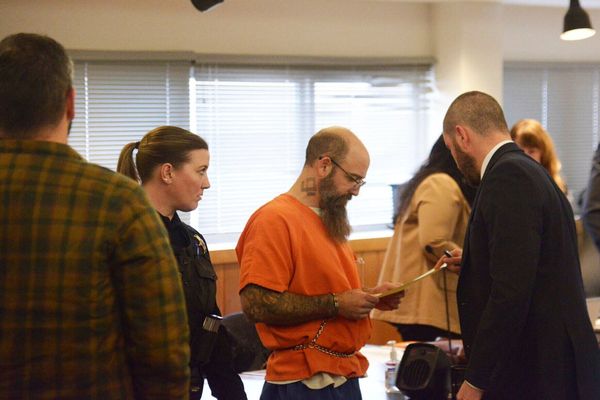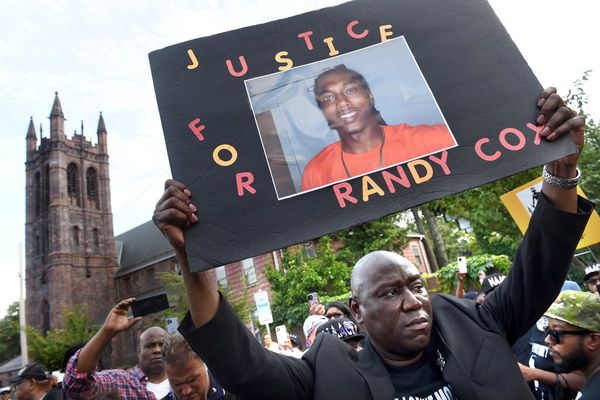
British mothers held in a prison camp in north-east Syria fear that they may die in detention after an “alarming” deterioration in living conditions.
Their testimony – revealed in a series of WhatsApp messages seen by the Guardian – will place fresh pressure on the UK government to repatriate them and their children.
In one message, sent last September, a British mother in her 20s says she feels she has been abandoned by the UK authorities. “I’m going to die here if they don’t get me out soon,” the message said, which was sent to UK family members from the Syrian prison camp Roj. “I really, really want to go back and be with you guys. I really need hospital care.”
Others, sent from a handful of British mothers to the UK throughout 2023, portray dire conditions within the controversial camp, describing malnourished children, premature deaths from treatable diseases, and toxic fumes from nearby oilfields triggering asthma, lung inflammations and suspected deaths.
An estimated 60 Britons are in Roj, including Shamima Begum, who left London in 2015 to join Islamic State in Syria as a teenager. Of these, about 40 are children, with most aged under 10 and detained indefinitely in the camp since the collapse of Islamic State four years ago.
Most European countries, including France and Spain, along with the US, have repatriated their citizens to face justice, concerned about the inhumane conditions, and that not bringing them home undermines global efforts to fight terrorism.
By contrast, the British government has stripped most of the women of their citizenship and, Australia aside, is the last western country to routinely block the return of families linked to Islamic State.
Sources say that the UK is fully aware of the worsening conditions within Roj, arguing that the UN has raised the issue repeatedly and British intelligence officials are believed to regularly enter the camps.
Katherine Cornett, head of the unlawful detentions team at Reprieve, a human rights charity, said recent Turkish airstrikes close to the camp left the facility without power and running water for several days last week, according to local reports.
Cornett said: “The situation really is getting worse. British detainees, none of whom have been charged with a crime or tried for a crime, have been held in awful conditions for years now.
“Children have died from a lack of access to hospital care. It’s just a matter of time before the same fate will befall a British woman or child.”

Other WhatsApp messages sent to family members in the UK reveal the detainees have no access to medicines. One described a dentist offering to pull out a child’s tooth without anaesthetic because it was not available.
“He wanted to pull the tooth out without injecting her. [The] mum rejected because [the girl] was really scared,” the message said.
A separate message from another mother said: “[I’m in] too much pain, I hate seeing [my son] go through all these things. I hope that the government says yes to me coming home.”
Another, sent last July, revealed how a mother was so desperate about her daughter’s continued poor health that she had asked family in the UK for help. “Her temperature was not going down at all. She had diarrhea [sic] with it. She was unable to walk, she was running out of breath. Can you give ideas?”
Others complained about the health impacts of nearby oil refineries.
A message sent last September read: “I know my lungs haven’t been the same since corona [Covid 19] two years ago, the production of crude oil and the smell from it is I think making it hard for me to heal better as I can feel the burn inside.”
In July, another British mother wrote: “A lady died last night, I think from an asthma attack. I couldn’t help but cry my eyes out.”
Another volunteer at the camp said the risk is amplified by Roj being only the size of two football pitches, a space into which 2,594 individuals, nearly 90% of whom are women and children, are crammed.
“It’s very securitised. There’s heavy surveillance, CCTV cameras everywhere, a lot of security guards with guns, huge fences. Movement is extremely limited,” they said.
Cornett said: “These are essentially internment camps, they have no freedom of movement, they cannot leave, their communications are extremely circumscribed. These are detention facilities.”
Many of the WhatsApp messages reveal concerning hygiene levels. “It’s very gross, I got this worm issue. They say it’s because of poor hygiene in the toilet areas … it’s basically one toilet for four tents,” one said.
In July, a UN expert issued a report after visiting Roj warning countries of their need to repatriate the women and children, highlighting their “absolute obligation to protect the right to life of their nationals”.
When asked if it would consider a change in approach to those held in Roj, the UK government said it had already repatriated some with most of these believed to be orphans or unaccompanied minors.
A spokesperson said: “UK officials have facilitated the repatriation of a number of British nationals from Syria. All requests for UK consular assistance from Syria are considered on a case-by-case basis, taking into account all relevant circumstances including, but not limited to, national security.
“Our priority remains to ensure the safety and security of the UK. We will continue to do whatever is necessary to protect the UK from those who pose a threat to our security, while also working with international partners to monitor the situation in Syria and provide humanitarian support.”







